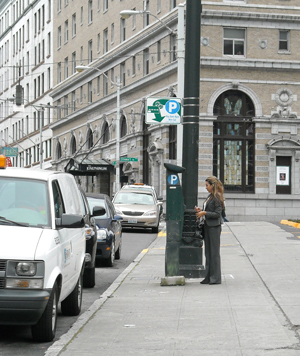Contemporary Approaches to Parking Pricing: A Primer

Photo credit: City of Seattle
8.0 Conclusion
Today, parking management and pricing appears to be on the cusp of significant, innovative, and accelerated change. Performance-based parking has proven to be successful, and cities are beginning to develop data-driven parking policies based on clear, attainable goals. San Francisco and Seattle offer examples of performance-based strategies that have earned both public and political support.
Advances in parking policy are being made possible, in part, by improvements in parking technology. New tools make it easier for cities to adjust pricing and collect utilization data. Steps are also being taken to develop database tools that integrate the information provided by parking assets from different manufacturers, which allows for the implementation of complex and user-driven parking systems. These improvements make it easier for cities to enforce parking regulations and for users to pay and comply with parking rules and fees.
Governments are also responding to the market distortions created by free employer-provided parking. Cities are implementing both mandatory and voluntary policies to encourage employers and developers to pass the cost of parking on to travelers, who in turn are then more likely to make travel decisions that are more economically efficient. Cities are also working to address issues associated with preferred users, including the disabled, city employees, and residents. Without carefully addressing these issues it will be difficult for performance-based parking policies to function effectively.
Cities interested in implementing new parking-pricing programs will soon benefit from large amounts of data from the Seattle and San Francisco performance-based pricing programs. Seattle is closely tracking the effect of pricing on utilization and is also experimenting with expanding time limits and making changes to policies for preferred users. San Francisco is collecting a wide array of data including information on the effects of performance pricing on parking search time, double parking, parking availability, air quality, sales tax revenue, parking tax revenue, and overall user experience. Data on efforts to address preferred users will also be forthcoming from Washington, DC; New York City; Chicago; Austin; and others.
In the end, cities rarely suffer from an absolute shortage of parking. Rather, it is their management processes that are often insufficient to provide drivers with reliable parking access and information. Moving forward, cities need to think broadly when developing solutions to parking and access issues. Parking and land use are closely intertwined, and parking policy decisions affect the physical environment, livability, and economic success of a city. Parking decisions cannot be fully separated from the political process, and each city must develop a solution that is appropriate to its needs. This primer is a guide in that process. The FHWA encourages planners, politicians, and community members to seek out additional information from other FHWA documents and events, published materials, and the cities whose programs were discussed in this document.